“Gain insight into contemporary language.”
Ross Berlin, `11
Attorney
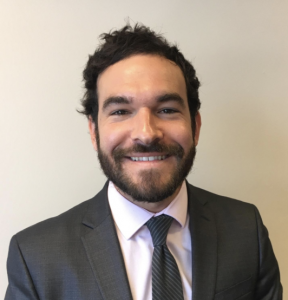
Studying classics at New College synthesized perfectly the individual freedom, academic rigor, and personalized guidance that drew me to attend New College. The expertise and flexibility of Professors Rohrbacher and Shaw allowed me to explore the nuances of the field of classics at its intersections with linguistics, history, philosophy, drama, anthropology, and political science. And the New College Classics Department shone brightest at the core of the discipline: the reading and understanding of ancient languages.
Professors Shaw and Rohrbacher are incredibly well-rounded language teachers. They skillfully balance the demanding, but rewarding, difficulty of classical languages with the often playful subject matter of classical texts. Neither professor fails to savor the intricacies of Greek and Latin and the literature the languages produced, and every lesson yields unique and unexpected rewards. Perhaps most importantly, both professors use ancient language to gain insight into contemporary language, contextualizing modern English usage in light of the languages that precede it. Beyond the consistently rewarding classroom experience, Professors Shaw and Rohrbacher also gave me the personalized attention that I needed to transform my approach to writing and excel as an academic writer. Today, many years after I graduated from New College, my relationship with the New College Classics Department continues to be one of my most rewarding personal and professional relationships.
Studying classics at New College laid the foundation for my career as a lawyer and legal scholar. My classics education uniquely prepared me to discuss with the judges I work with the meanings of words, how those meanings have changed over time, and whether we should use one or the other in a judicial opinion that will become the law of the land. Language is the lifeblood of the law, and thanks to the rigor of my New College classics education I never question my ability to accurately read a case, situate it in light of a controlling legal framework, and precisely present my interpretation to a judge. I simply cannot see how I would succeed as a lawyer without the education I received in the New College Classics Department.
“Develop proficiency in multiple languages.”
Zachary Low ’12
Nonprofit Manager
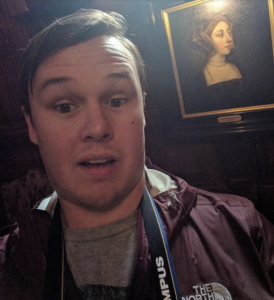
What did Classics teach me? It taught me empathy. It taught me that the people who lived 2-3 thousand years ago had the same daily complaints about “kids those days” or the “price of grain” that our generation still fires off.
Classics taught me the value of polylingualism, both through its focus on the ancient (Latin, Greek) and scholarly (German, French) languages as well as the rampant bilingualism present in ancient society (see the works of James Adams).
My professors showed me that even the driest of topics can be dressed up with a healthy coating of humor that even the most glassy-eyed fresh-out-of-high-school-grade-coasting teenager can have their lax attention picked up, slapped around, and refocused. This helped me through the toughest professional problem of my life during my post-collegiate life as a teacher of English for Academic Purposes: how to make learning the unspoken order of English adjectives enthralling to a bunch of under-caffeinated adults.
Hammering my head against Juvenal taught me critical thinking skills as I skipped back and forth between metrical lines hunting for and piecing together any sort of sensible translation. The same happened with Catullus, figuring out how to best adapt ancient invective to modern insults, pushing beyond mere word-to-definition translation and instead thinking like a wealthy aristocratic Roman, which I most assuredly am not.
How has any of this actually helped me and kept me from the dreaded clutches of barista life? What do I have to show for it? I show proficiency in multiple languages; I do not hesitate to throw myself at the incomprehensible and research and analyze and evaluate it until it is conquered, veni vidi vici. In my current job as operations manager of a small non-profit, where a team of four people are to create, update, and run a business doing professional development in international education, I attribute my ability to wear multiple hats and learn new topics completely foreign to me to my time studying Classics. When I am called to speak in front of a large group of people from every corner of the Earth, I thank Cicero for giving me some ideas. My public relations skills come courtesy of Caesar and Aristotle.
Classics is more than just reading myths. It’s linguistics, philosophy, history, logic, culture studies, leadership, a dash of science political and natural, and, yes, some literature. It’s getting a jump start on your law exam because you know all those italicized words. Or flying through the GRE because you know how to break down language into comprehensible parts and put it back together again. It’s being able to read more than just the back of a dollar bill. It’s the original multidisciplinary field. It’s, in short, fantastic.
“Make connections across fields.”
Tyler Kirby, `16
Software Engineer
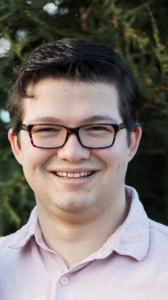
My favorite things about studying classics at New College were definitely the people and the material. It was a ton of fun and a great way to spend four years. Reading the Odyssey by the bay at sunset is an unforgettable memory. The material was always engaging and interesting no matter the semester, and the professors always did an amazing job bringing the authors to life. This is something that I didn’t fully appreciate until my brief stint in grad school where people were much less exciting and seminars were kind of musty and stilted.
Since I left classics grad school, I’ve worked in tech: web development, mobile applications, computer vision, and now financial machine learning. Most people I work with have extensive backgrounds in computer science, business, and mathematics. But a surprising number have non-technical backgrounds as well. One of the best mobile engineers I’ve worked with started her career as a baker.
There are several observations I have on studying classics then entering tech. Greek and Latin are much harder to learn than Python and JavaScript. And having studying the classical languages formally has helped me to study computer languages on my own. Studying Greek and Latin has greatly improved my ability to think clearly and consistently about a matter for a prolonged amount of time. That’s really what translation is and truly what programming is, too. They are exercises in being consistent and deliberate in thought.
Beyond the languages, classics encourages you to make connections across fields. It’s the epitome of multidisciplinary study. So is data science: a mess of computer science, mathematics, statistics, and business. To be good at either of these requires you to be comfortable reaching for tools outside your immediate tool box.
“Reflect on the wider themes of ethics and humanity.”
Annie McCabe, `18
MBA Candidate

Majoring in Classics is signing up for a group of friends who will wake you up at 2 am texting you bad Iliad puns, but they’ll also be there with flash cards and extra snacks for your morphology all-nighter in the library. When everyone is passionate about their subject, you can’t help but have a good time. Even when we were stumbling over meter or mixing up infinitives, we were laughing at ourselves.
Majoring in Classics is taking classes with professors who genuinely care about your future and your personal development. It’s waiting eagerly for the next class tangent about iambics or the Peloponnesian War. It’s discussing themes of free will, morality, sexuality, humor, family, war, and truth. It’s studying languages that define the way we think, speak, and write thousands of years later.
For me, the key appeal of Classics is the depth of study. No matter how much you read and translate, there are still texts no one has studied in hundreds of years. No matter how much you analyze a text, there’s always a new approach. There’s always another fascinating story or absurd fact you learn about life in Ancient Greece that’s just delightful to know.
I’m pursuing an MBA with a concentration in finance and international business. Students in MBA programs really do come from all walks of life, from project managers to philosophy majors, but my classmates still do a double-take when I tell them I studied Ancient Greek in undergrad. There’s a conception that Classics just teaches dead languages and ancient history. And sure, I don’t encounter a lot of Tacitus at work. But the most important lesson you pick up in a Classics major isn’t the ability to rattle off the third declension.
Classics taught me pattern recognition, textual analysis, effective writing skills, critical thinking, and quick memorization. It improved my vocabulary and my sense of expression. It taught me how to conduct thorough research, make informed analyses, and defend my conclusions with confidence. Every job you’ll ever have is going to apply those skills. My current job as a marketing and PR professional certainly does.
Perhaps most importantly, Classics taught me to reflect on the wider themes of ethics and humanity. There’s a constant pressure for utility in higher education, and I do understand why. College is a considerable investment, and it’s reasonable to want a return. But when schools focus exclusively on the bottom line, you miss the real, intangible benefits of a broad education. Recruiters want employees who can write well, speak well, and reason critically, who are ethically conscious and highly disciplined. More to the point, society needs those skills too.
“Study the past so we can ask questions about the present.”
Sara Macke, `17
M.A. Candidate in Marine Archaeology
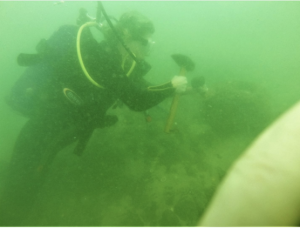
I was the “interested in mythology” kid, the one who read all the popular mythological fiction, knew the stories, and was interested in ancient history. At New College I wanted to study marine biology and at first I took a lot of natural sciences classes, plus Latin. But the more time I invested in Latin and then Greek, and they do require a substantial amount of time and practice, the more I began to love the process of learning the languages, reading original texts plus some in translation, and learning about history. Studying classics at New College was always thought provoking and often hilarious, from discussing Homer’s perspectives on war and life, physics in Lucretius, to a good joke, dirty or otherwise.
I’m currently pursuing an MA in marine archaeology, combining my interests in history and the sea. My thesis project is focused on developing a methodology to provenance stone anchors from the Bronze Age eastern Mediterranean using petrographic and geochemical analyses in order to answer questions about ancient Mediterranean life, interactions, and networks. I get to spend a lot of time at work in the dirt or in the sea.
While classics is perceived as being excessively niche, it is by nature interdisciplinary. The influence of ancient cultures pervades so many aspects of modern life, and by studying the past we can ask questions about the present. The current post-graduation climate can seem precarious, and while a degree in classics may not feed directly into a set line of work like some other fields of study, the skills learned, both practical and creative, I believe, are the outcomes necessary to navigate the “real-world” and are those that employers greatly value.
“Explore texts rarely taught in undergraduate curricula.”
Brendan Rabon, `08
Poet
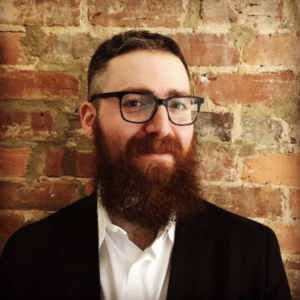
I was bound to study Classics. To paraphrase a line by the poet Hölderlin, “I grew up in the arms of the gods”, embracing the vast and changeable world of Greco-Roman mythology in childhood, spending my years before college eye-deep in the pages of Edith Hamilton, Homer, and Euripides. By the time I entered New College, I was eager to immerse myself fully in ancient texts and languages — and immersion, something difficult if not impossible to experience at other universities, is what I found. What I appreciated most about studying Classics at New College is the program’s blend of rigor and flexibility. Courses were challenging but always rewarding, providing a level of depth I would later discover only in graduate-level seminars.
I am also incredibly grateful for the numerous tutorials I developed alongside my professors which provided me with the opportunity to explore texts rarely taught in undergraduate curricula, even reading authors considered marginal by the most adventurous doctoral candidates. Professors David Rohrbacher and Carl Shaw are passionate and patient teachers, displaying an irresistible zeal for the subject matter and creating a sense of community in the classroom that is exceedingly rare. Classics at New College instilled an ethos of confidence without arrogance, independence of thought and inquiry, and how to cultivate ambition — an ethos that has and will continue to inform how I lead my life.
It is no exaggeration to say that my time at New College — the courses and tutorials I took there — was a sort of crucible that changed and tempered me professionally, intellectually, and poetically. By the time I began working on an M.A. in Classical Languages, New College had thoroughly prepared me for the combined challenge of balancing coursework with independent research, which is crucial for survival in graduate school. For students who wish to pursue their classical studies beyond an undergraduate degree, Classics at New College offers a remarkable and thorough preparation.
I may no longer be a student, but I have never stopped reading classical literature, particularly Latin poetry, more than ten years after leaving New College. Learning Latin with David Rohrbacher was a gift I cannot properly thank him or the college for enough. It has given me access to a body of literature that I will read and re-read for the rest of my life. Since graduation, I have read Vergil’s Aeneid in its entirety twice; I have traveled to Bulgaria’s Black Sea coastline with Ovid’s chattering Heroides in tow; even now, as I type this, I have a lengthy reading list on my desk — Juvenal, Horace, Lucan — and I cannot wait to tackle it. I have loved Latin since my first semester of learning at New College, and I will love it, share it, engage with it, travel with it for decades to come.
“Earn a degree in intellectual fearlessness.”
Matt Newton, `08
Lawyer
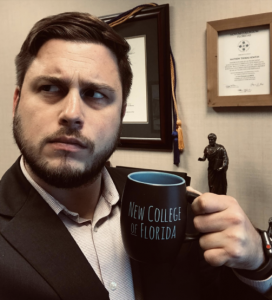
When I first transferred to New College from Marymount Manhattan, I had no clue what I would ultimately study. As I generally enjoyed history, I enrolled in a Roman Civilization class taught my Professor Rohrbacher — one of the most entertaining educators in existence. In an effort to remain entertained, I later asked what he was teaching the upcoming fall. He informed me that he was only teaching Latin and Greek, and invited me to enroll. I thought studying these ancient languages sounded exceedingly difficult — but if anyone could make it interesting, I trusted that Rohrbacher (and later, Carl Shaw) could. I was correct.
I quickly fell in love with studying history through the original texts. As the classes became more advanced, the more hardcore classicists emerged, and the more closely-knit nerd barbarians we became. I personally embraced Latin poetry: the macabre imagery of Ovid, the filthy humor of Catullus, and the flowing verses of Vergil. I felt accomplished after a translation, and felt an intellectual pride that could only come from semesters of wearing out the spine of a Greek – English Lexicon. Classics gave me an intellectual confidence that cannot be replicated by anything else.
New College’s classics program gave me a degree in intellectual fearlessness. As a practicing attorney with a degree in classics, I am not intimidated by any academic challenge. I can solve any legal problem with time, treatises, and a pen. Had I not spent years at the library walking the stacks in pursuit of my classics degree, I would not have the confidence that I have today. I strongly encourage every aspiring attorney to study the classics with David Rohrbacher and Carl Shaw.
“Learn how to research, think critically, and communicate effectively.”
Kai Doore, `08
Fantasy Novelist
I loved the people – the other students who were eager to learn, the faculty who were equally eager to be there. I liked the small class sizes, the emphasis on history and language and culture as all part of a larger, moving whole. I liked that discussion frequently continued outside the classroom, where students would bring together different ideas from different classes over video games or Marriott meals. I especially liked the humor and enthusiasm of the faculty, who clearly wanted to be there and teaching. I took many of these things for granted at the time, but having met many people now who went to other, larger universities, I’ve realized how rare and special that was.
Studying Classics gave me the skills I needed to be successful at almost anything – which I know is one of those things people always say but which I’ve found especially true in my circumstances. I’ve had many different jobs, and knowing how to research, how to think critically, and how to effectively communicate through writing are skills that were essential to all of them. Classics gave me the ability to drop into such disparate fields as real estate (property title and, later, assessment) and eLearning (writing, design, and development). And I can’t say enough about how the thesis process taught me to research and write and revise and revise and revise, which has been essential to my writing career. I still employ a number of tricks I picked up while working on my thesis whenever I’m writing a book, as well as working on any dauntingly large project.
“Parse scientific names and recognize technical terms in Latin.”
Claire Miller, `06
Librarian
I’m currently an academic librarian at a rural community college in central Florida. My course work at New College in the Classics department continues to be relevant in my daily work even though I don’t work directly in the field. I’m valued as a subject specialist in my library in a variety of fields due to my extensive and eclectic course work at New College including Classics.
My one term of Latin taught me more than any other class HOW to learn a language. Looking at the ways that Latin does and does not survive in modern English honed my ability to parse language, and even my sparse knowledge of Latin continues to come in handy as I work with science students. Being able to parse scientific names and recognize technical terms in Latin is a real asset in the hard sciences! I even spent a few years working for the the Catholic Church as a cataloging librarian where my smattering of Latin came in handy on a weekly basis.
But more importantly, my experience studying classics at New College shaped my understanding of (western) culture, theater, and literature. As a reference librarian, I’m often a point of contact for students struggling to engage with the material in their humanities, literature, or history classes. My course work in Greek and Latin theater, literature, and poetry means that I have the context and academic background to help students engage with this material and lead them to the very best scholarly sources. In the last term alone, I’ve helped students compare the family dynamics of Oedipus Rex and Antigone, Herodotus and the movie version of 300, and the differences between Demeter and Ceres as fertility goddesses. Without the in depth study I was able to devote to the classics at New College, my understanding would be much more surface and less culturally rooted.
“Be a committed and accountable learner and thinker.”
Bill Kingdon, `13
Accountant
It’s more important to be a good learner and thinker than to have technical training. Any technical knowledge you have can be absorbed by some other competitor – human or machine – and its economic value can grow, sometimes, but will eventually hit zero. I didn’t want to have an education that was geared to one specific type of job after college, because I knew that job might not exist by the time I graduated or ten years from now. Classics, as a mode of thinking, has withstood the test of time.
Classics at NCF, by necessity of the complex translation work and small classroom size, will require you to be a committed and accountable learner and thinker. The advantage from Classics in my career has been a willingness to face work head-on — I learned how to stare down a mountain of complicated work (a thesis, the Satyricon, chapters upon chapters of Homer) and grind through it. In my accounting career, I’m trusted to know the financials and understand the impact of complicated transactions because I’ve learned to dig beneath the surface and not be intimated by complexity.
Greek and Latin grammar may seem a confusing and dry topic. Its rules will appear arbitrary, but practice and dedication reveal a beautiful internal logic and consistency. If you can learn to love that class of things that seems dry and random, but is actually complex and rules-based, you have given yourself enormous leverage. That appreciation can be learned as Classics major, and extended to any number of areas: accounting, taxes, programming, etc. Careers are made when you’ve learned to love something other people can’t imagine doing.
“Develop the ability to think critically and incisively.”
Kerrick Lucker-Goodman, `05
Teacher
I first took Classics courses at New College for, shall we say, not the most intellectually rigorous of reasons: The professors were fun and made me laugh, and I liked intoning Greek and Latin in a sonorous voice with dramatic hand gestures. Even an ancient grocery list sounded like an occult secret. But the more I studied, the more I came to realize something important about civilizations of the past: studying ancient civilizations helped give me perspective on our problems today. Rome fell. A thousand-year civilization ended as a political entity. It was a disaster, for the Roman aristocracy. But for the average people of Rome, it meant you could tear up the roads and plant more cabbages and they wouldn’t get trampled by the legions. This gives me hope.
I’m now teaching engineering to elementary school students. I got a Master of Arts degree in Museum Education intending to work in museums designing educational programming to interpret archaeological research for the general public. Life had other ideas, and as it happened, I got my start in science museums. I found my humanities background was essential in identifying overarching ideas and explaining the social importance of topics in science.
When I went into the classroom as a full-time teacher, I used my background in science museums to inform my curriculum development and make sure I covered important engineering concepts, but it is my background in humanities–what societies value, how that has changed over time, and how people think about problems–that I really rely on to make sure students learn to think critically, solve problems effectively, and work together respectfully.
One of the best compliments I’ve ever received was from a colleague whose daughter also happens to be in my class. He said “What I most admire about you is that you teach engineering as a humanistic discipline.” It’s not only important to know how to design new technologies to solve problems; it’s important to understand why.
More and more, the field of engineering is coming to understand that engineers, to be successful, need a broader view on life. For example, look at IDEO, an internationally renowned design firm which hires a diverse team of deep thinkers with backgrounds in education, psychology, philosophy, and linguistics to work together to design innovative products that solve some of the toughest technological problems in all kinds of fields.
Classics to teaching engineering might not seem the most intuitive career path. Graduate programs and professional fields, however, are coming to realize that it’s not so much what you call what you studied that matters as whether you have developed the ability to think critically and incisively. In every field, leaders have to learn to see past the fog of opinion and detail into the values and needs that underpin the social issues that challenge us today–much as the Roman Empire was challenged by the problems that arose from the overexpanse of its territory, internal fragmentation, and abuses of power. We have much to learn about our most pressing problems from looking at civilizations of the past, their history, literature, philosophy, and art.
Most importantly, studying Classics at New College helped me learn about myself. I was launched into an undergraduate thesis project examining gender transgressiveness in Greece, Rome, and the ancient Near East, just as I was embarking on a serious reevaluation of my own relationship with gender norms in society. Not everyone who studies Classics will end up queer and/or transgender (however devoutly some of us might wish for that). It helps, though, to see that societies and individuals throughout history have had experiences similar to our own, that human diversity has existed throughout history, and that different societies have accounted for diverse individuals and experiences in their own unique ways.
“Take a question, break it down into parts, and figure out where to get answers.”
Vanesa Botero-Lowry, `05
Operations Manager
Up until my junior year of high school, I had intended to go to college for veterinary medicine. I signed up for Latin because I figured it would be helpful for scientific vocabulary reasons. I fell in love with Latin my freshman year and after a couple of years I realized that I would be much happier pursuing a Classics degree than a science degree. I’m so glad I made that choice. I absolutely cherish my Classics degree from New College. Don’t tell my graduate school (a masters degree in public administration), but it was the most academically interesting and rigorous experience of my life. I adored being able to study one field through so many different lenses (language, literature, history, etc.), and I believe that my time in Classics made me a better student of everything else.
Anyone who takes a Latin class or shows interest in studying Classics gets a similar spiel about how Classics will teach you to be better at English because you’ll study the underlying grammatical structures borrowed from Latin and how you’ll understand all sorts of literary allusions in English literature that refer to classical sources. That stuff is true (though the grammar stuff didn’t help my tendency towards long sentences…), but I think it also misses a big part of the point.
Yes, I can spell weird words well and I catch allusions that others might miss, but I think the work we were asked to do to truly understand what we were reading and studying was more valuable than just reading the texts. I’m able to read literature more deeply because of the time I spent learning to read different classical texts with a critical eye. I’m able to more carefully analyze history and even current events because of the time I spent learning classical history and mythology under teachers who insisted that I think beyond just what was being said on the surface.
As someone who often coasted through school by virtue of being smart and good at taking tests, I also really appreciated being pushed. I still remember hearing a professor say in one of my first classes that “even Mark Twain had an editor” while explaining that he would be putting critical comments on every paper, no matter how strong. I grew so much as a writer because I chose to study Classics at New College, and that was because I never got a paper back without a slew of comments on how it could be improved. I don’t always get to practice those skills in my life now (as you can tell from this writing), but I value them all the same.
Finally, while it’s not always something people take into account when choosing a college major, I just want to say that studying Classics at New College was fun. I don’t think I had a single class where I didn’t at least chuckle and there were several that nearly brought me to tears laughing. I read some works that rank among my favorite, ancient or modern, and I learned about things I never would have thought to study had they not been part of the curriculum. Plus, getting the allusions is pretty awesome. Ask me about all the classically themed webcomics I read now 😉
My career is in Non-Profit Operations. Ops roles (and often non-profit roles in general) tend to be jack-of-all-trades positions. In a given job, I might simultaneously do work in accounting, event planning, database management, project management, fundraising, HR, IT, emergency planning, and so on. There are three things I got from studying Classics at New College that are invaluable to me now in that work.
- Attention to Detail: I do a lot of work where attention to detail is crucial—general bookkeeping, maintaining financial and legal records, managing major fundraising and communications databases, and more. I don’t think most people would tie my love of a well-crafted spreadsheet to my Classics degree, but I do. I spent my entire college career doing something that everyone who has ever translated Latin or Greek is familiar with—carefully copying lines of text in the original language onto a sheet of paper with every other line skipped to leave space for the translation. There is a particular type of extreme frustration that comes from struggling with a translation that just doesn’t make sense only to realize that the reason it doesn’t make sense is that you copied the original line wrong. A few late nights caused by that type of error and you learn to be very, very good at paying attention. I am so often the person at work that catches errors that no one else notices, and it’s mostly because I’m still subliminally annoyed about some of those mis-copied lines messing up my translations.
- Research Skills: It’s not uncommon in my work to be asked to figure out how to do something random that we’ve never done before. How do you get a film permit in Times Square? How do we transport 75 people from Louisiana to Arizona and back for the lowest possible cost? What are the labor laws governing freelance reporters in Australia? How do we contact 100 volunteers to check in with them after a hurricane when everyone’s cell phone is down? One of the reasons I enjoy and do well in Operations roles is that I’m a strong researcher. A lot of my strength in researching comes from my time studying Classics at New College. The topics and tools are certainly different now, but the process is largely the same. I’m able to take a question, break it down into component parts, and figure out where to get the answers I need because I was trained to do that while studying.
- Ability to Handle Variety: I mentioned that one of the things I loved about my degree was the ability to study one field from so many different perspectives. That same mindset helps a lot in Operations work. I often have days where every hour of my day looks completely different. At an event, for example, I may be the person in charge of coordinating speakers, volunteers, vendors, and attendees. That can mean that one minute I’m helping the stage crew build signage, the next I’m processing a credit card refund for an attendee who bought an extra ticket, the next I’m helping the volunteers in charge of event composting figure out where the bins are, and the next I’m escorting a celebrity guest. That same level of variety can be true in the office as well. For me, it’s one of the best parts of my job, but it can be a real struggle for people who aren’t able to handle variety well. I suspect that I would have loved variety even if I hadn’t been a Classics major, but studying Classics is a big part of how I figured out that it’s something I love. I don’t think I would have chosen the career path that I did without knowing that I have the ability to handle a lot of disparate types of work being thrown at me at once, and I wouldn’t know that without my Classics degree.
“Learn to think on your feet, debate with others, and take full advantage of professors’ knowledge.”
Naomi Campa, `06
Classics Professor
I loved studying Classics at New College because it felt like a truly interdisciplinary field in which I did not have to sacrifice any of my budding curiosity about philosophy, literature, history, politics, or philology (once I found out what that was). I could combine what I was learning in different social sciences and humanities classes into one concentration.
The Classics department was also small, which gave me a lot of access to mentoring from my professors—who happened to be total rock stars. They encouraged me to pursue my interests and guided me in independent studies and tutorials from spoken Latin to Platonic ethics. They were always willing to meet with me whether to work out new ideas for an essay or further discuss class readings.
I feel like I really got the NCF experience in terms of funneling my “natural state of ecstatic wonder” into rigorous goals and satisfying achievements. The feedback on assignments, in course evals, and in person gave me the opportunity to reflect on my strengths and weaknesses and to consider how to best make myself improve; something I had never truly done in high school. The Classics concentration was also really fun: classes were great, Prof. Rohrbacher is hilarious and brilliant, and the department even supported my organization of a 12-hour continuous reading of the Iliad with music, food, and games.
Once I ended up in graduate school for a Classics PhD, my experience in Classics at New College also had obvious benefits. While graduate school is a different beast than undergrad, the skills I had learned were crucial to my success in this new and challenging environment. I was comfortable participating in seminars, knew the basics of executing a research paper, and felt confident in seeking guidance and receiving feedback from professors. All these skills had to be improved by infinite degrees, of course, but the ability to think on my feet, to debate with others, and to take full advantage of professors’ knowledge smoothed my transition from engaging with Classics as a course of study to Classics as a profession.
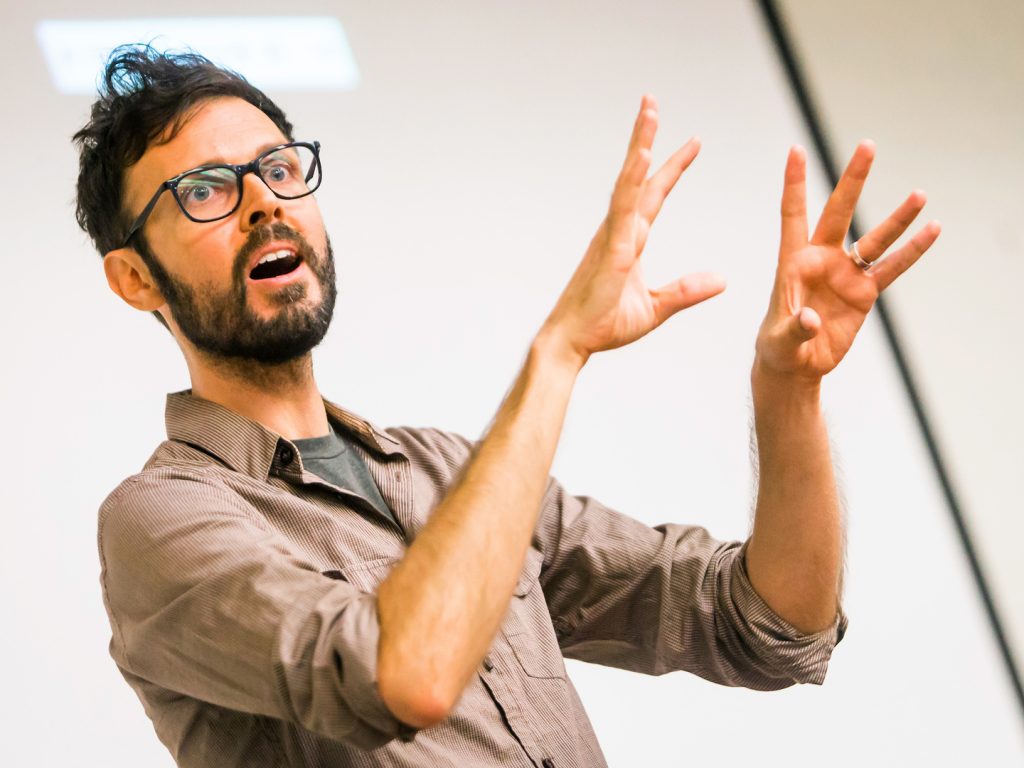
Classics Area of Concentration
Classics is the study of the languages, culture, history, and thought of the civilizations of ancient Greece and Rome. It is one of the most varied and interdisciplinary of all subjects.
